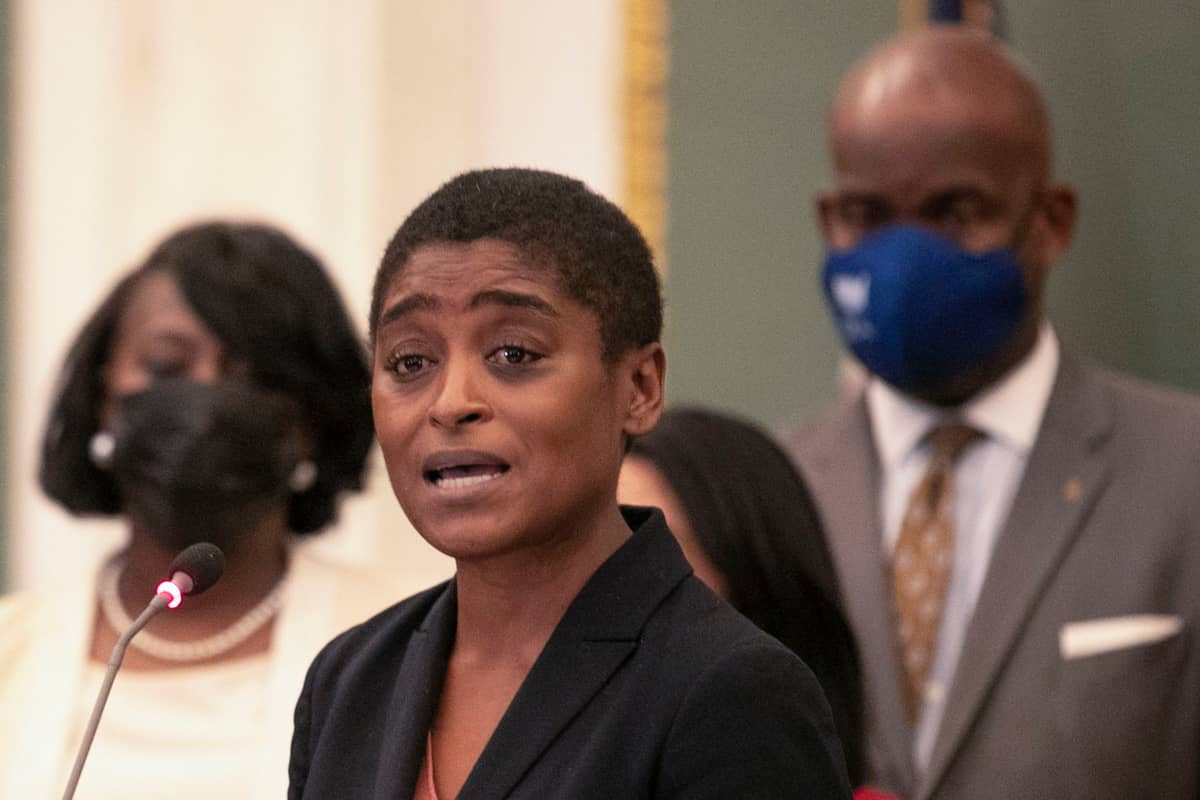This article is shared with LebTown by content partner Spotlight PA.
By Danielle Ohl of Spotlight PA
HARRISBURG — Pennsylvania could shed its reputation as the only state in the country that does not fund public defense, if the legislature approves a proposal in Gov. Josh Shapiro’s budget.
In his first budget as governor, Shapiro, a Democrat, has proposed $10 million of state money to support no-cost legal representation to “indigent” Pennsylvanians, those who have been accused of a crime but cannot afford an attorney.
Read More:
- Hearing held to discuss indigent legal representation in criminal court
- Lebanon County resolves conflicted court case issue for indigent defendants
The $10 million proposal would be the most funding the state has ever dedicated to supporting the constitutional right to counsel, an obligation individual counties currently pay for entirely on their own.
Legislators and legal experts have criticized this model for decades because it creates an unequal system where the quality of defense a person receives depends on the county where they live.
But even if the legislature approves Shapiro’s proposal as part of this year’s budget, the infusion would still leave Pennsylvania “isolated” in a country where most states take on at least 85% of all public defense costs, said David Carroll, executive director of the Sixth Amendment Center, which advocates for expanding access to indigent defense.
“I think $10 million is an important first step and that Governor Shapiro should be applauded for his leadership,” Carroll said. “That said, Pennsylvania counties currently expend approximately $125.5 million on indigent defense.”
The right to counsel in criminal proceedings is promised to defendants under the Sixth Amendment of the U.S. Constitution, but Pennsylvania has long fallen short of its constitutional obligation.
In 2011, a bipartisan task force of state legislators charged with studying public defense in Pennsylvania published a report that called the system deficient and said the General Assembly was overdue in performing its duties under the U.S. Constitution.
“In many of Pennsylvania’s counties, the most brilliant and accomplished lawyer could not provide adequate representation because he or she simply would not have the time and resources needed to mount a constitutionally adequate defense,” they wrote.
“Broadly speaking, Pennsylvania’s indigent defense labors under an obsolete, purely localized system, a structure that impedes efforts to represent clients effectively.”
Little has changed in the decade since the report was published. Pennsylvania has seldom contributed state funds to public defense and never consistently, according to state officials.
“In previous years, the state did occasionally support some one-time projects related to indigent defense,” said Kirsten Kenyon, director of the Office of Research, Evaluation and Strategic Policy Development within the Pennsylvania Commission on Crime and Delinquency, a state agency.
In 2013, the state directed $500,000 in grants to counties to reimburse costs for indigent defense in capital cases; and in 2022, the state allocated $100,000 for indigent defense training, “but these were not long-term commitments,” Kenyon said.
The commission, which develops criminal justice policies for the state, has also used federal funding to support public defender training within the commonwealth annually since at least 2000, Kenyon said.
But the current system has led to wide disparities in the quality of legal representation available to state residents.
For example, Philadelphia provides extensive public defense services through the city’s Defender Association, a nonprofit firm that receives most of its funding from the city.
Chief Defender Keisha Hudson said the Defender Association budget alone tops $50 million, which helps the organization employ 500 attorneys, investigators, and social workers. Rather than churn through a heavy caseload, the staff helps build a comprehensive defense and identify elements of a person’s life that might mitigate their sentence, Hudson said, a level of practice that isn’t possible in most other counties.
A county-by-county review by the Legislative Budget and Finance Committee of the General Assembly in 2021 found Philadelphia spends the most money on criminal defense per person, around $30.20 in fiscal 2019.
The same year, Mifflin County in rural central Pennsylvania spent only $3.20 per person.
Less populous counties with fewer potential wage earners and lower property values cannot afford the same level of services, said Carroll, the Sixth Amendment Center director.
“Counties with higher levels of poverty are also called on to spend more of their available funds on social services, such as medical care for the uninsured and housing needs for the under-employed, leaving less money available to spend on the provision of the right to counsel for indigent people,” Carroll said.
“This is the case even though these counties are most in need of funds for indigent defense services since they have larger percentages of people who lack the means to hire a private attorney.”
The consequence of such scarcity is both human and financial, Hudson said. Pennsylvania has no universal training standards or requirements for public defenders, which can result in an ineffective defense and a costly appeals process.
“We have so many people sitting in our jails, in our state prisons, on death row,” Hudson said, “who had counsel who … cared about their client and wanted to do the best for their client, they just did not have the resources or the training.”
When counsel is inadequate upfront, Hudson said, the cases can languish and cost taxpayers millions in additional litigation: “With the number of wrongful convictions that have come to light and the litigation from those wrongful convictions costing places like Philadelphia 10s and 10s of millions of dollars, my argument is why not invest upfront in the earliest points of intervention?”
Shapiro’s budget proposal would give $10 million of general fund revenue to the Commission on Crime and Delinquency, which would then work with the legislature to develop a plan to spend the money.
One such plan could be a recently introduced bill from state Sen. Lisa Baker (R., Luzerne), chair of the Senate Judiciary Committee. The bill, which Baker co-sponsored with state Sen. Vincent Hughes (D., Montgomery) and other legislators, would establish an indigent defense advisory committee to create oversight rules, develop training standards, collect data, and distribute grant funding to counties.
A spokesperson for state Sen. Scott Martin (R., Lancaster), chair of the chamber’s Appropriations Committee, said he is still evaluating the finer details of the budget proposal.
“This issue is one of the many topics that will be discussed during negotiations in the weeks and months ahead,” he said.
To Hudson, the $10 million should be spent entirely on training.
“It may just be enough if we spread it across 67 counties to have some training in place,” she said, “for when new attorneys start and for experienced attorneys and for people doing capital work.”
WHILE YOU’RE HERE… If you learned something from this story, pay it forward and become a member of Spotlight PA so someone else can in the future at spotlightpa.org/donate. Spotlight PA is funded by foundations and readers like you who are committed to accountability journalism that gets results.
























